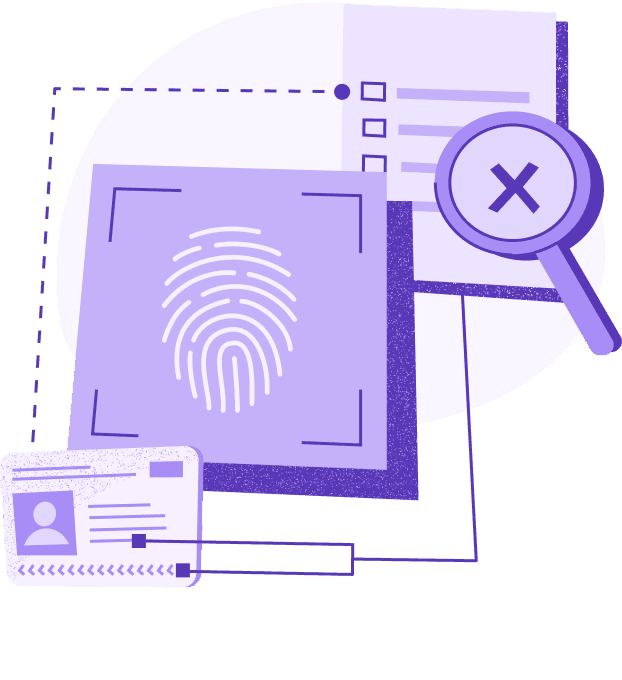Article
5 min read
A Guide to Employee Background Checks in Croatia
Employee background checks

Author
Michał Kowalewski
Last Update
April 14, 2025

Table of Contents
What employers need to know before running background checks in Croatia
Are background checks legal in Croatia?
What types of background checks are illegal in Croatia?
Common background check industries in Croatia
Types of background checks in Croatia
Background check mistakes to avoid in Croatia
Step-by-step guide to employee background checks in Croatia
Run employee background checks with Deel
Key takeaways
- Background checks in Croatia must comply with the Law on Personal Data Protection and GDPR. Employers need explicit candidate consent and must process personal data lawfully, fairly, and transparently.
- While not mandatory, background checks are crucial in Croatia, particularly in sensitive sectors like finance, healthcare, education, government, and IT.
- Conducting thorough background checks involves verifying work history, education, professional qualifications, and criminal records.
Employee background checks should be an integral part of your hiring process in Croatia. Although not mandatory, they are a common practice, particularly in sectors such as finance, healthcare, education, government, public sector, security, and law enforcement.
Croatia's rapidly developing tech industry, growing at 4x the rate of its overall economy, makes it an attractive hub for hiring, especially in IT. The country offers a skilled workforce with strong STEM education, competitive costs, and robust EU-aligned legal and tax policies.
When hiring in Croatia, it's important to be mindful of local employment laws, especially regarding background checks, which are mostly prohibited unless candidates give their consent.
In this article you’ll learn:
- How to run an effective and legal employment screening in Croatia
- Common types of employee checks in Croatia
- Step-by-step process of a thorough employee screening
- Mistakes to avoid when performing a background check in Croatia
- Essential information for a background check in Croatia
What employers need to know before running background checks in Croatia
An employee background check is the process of verifying a potential hire’s work history, education, professional qualifications, and any criminal records they might have. It’s particularly beneficial to run before finalizing an employment offer or signing a contract, ensuring the candidate meets the company's standards and requirements.
In Croatia, employee background checks must comply with the Law on Personal Data Protection, which is aligned with the General Data Protection Regulation (GDPR). The Croatian Data Protection Agency (AZOP) plays a key role in overseeing compliance.
- GDPR: Emphasizes the protection of personal data in the European Union, impacting how employee background checks are conducted by requiring lawful, fair, and transparent data processing. Organizations must ensure they have a legitimate basis for such checks, often necessitating explicit consent from the individual.
- Croatian Data Protection Agency (AZOP): This body oversees the enforcement of data protection laws in Croatia, ensuring organizations adhere to these regulations during employee background checks and other data processing activities. The agency's responsibilities include monitoring compliance, providing guidance to organizations, and addressing individuals' complaints regarding data protection violations.
Are background checks legal in Croatia?
Yes, background checks are legal in Croatia, provided that they comply with the GDPR and other relevant data protection laws. Recruiters must obtain the candidate's consent before conducting a background check, and the processing of personal data must be justified by a legitimate purpose, such as assessing the candidate's suitability for employment. Although it’s not specified in the law, written consent is recommended for documentation and compliance purposes.
Background checks
What types of background checks are illegal in Croatia?
In Croatia, background checks that involve the indiscriminate collection of personal data or infringe upon an individual's privacy rights are considered illegal.
Stay clear of:
- Non-consensual verifications: Conducting any background check, such as a credit check, without the candidate's explicit consent is prohibited. Additionally, obtaining information about a candidate's religious beliefs, political opinions, or other protected characteristics without consent is illegal.
- Unlawful practices: Recruiters must refrain from using deceptive or unfair methods to obtain information during a background check. Such practices violate the principles of fairness and transparency under Croatian data protection laws.
- Social media checks:. While reviewing publicly available information about a candidate on social media platforms is not forbidden, recruiters must ensure the information is relevant to the job requirements. Using social media to gather information about a candidate's protected characteristics, such as race, ethnic origin, or sexual orientation, is prohibited and can lead to legal consequences.
Violating data privacy laws during employee background checks in Croatia can lead to significant legal repercussions due to strict adherence to local data protection regulations.
Specifically, under Croatian data protection laws aligned with GDPR, fines for infringements can be severe:
- Less severe violations can result in fines up to €10 million or 2% of the firm's global annual revenue from the previous fiscal year, whichever is higher.
- More serious infringements can attract fines of up to €20 million or 4% of the firm's worldwide annual revenue from the preceding financial year, again whichever is higher.
Common background check industries in Croatia
In Croatia, background checks are especially prevalent in industries where trust and security are paramount. These include:
- Finance and banking: Given the sensitivity of financial transactions and the need to safeguard against fraud and embezzlement, background checks in the finance and banking sector are essential. Employers need to ensure that candidates have a clean financial record and can be trusted with handling sensitive financial information.
- Education: To ensure the safety of students, educational institutions conduct thorough background checks on potential employees. This is particularly important for positions involving direct interaction with children and young adults. Verification of credentials, criminal record checks, and reference checks help in maintaining a safe and secure learning environment.
- Healthcare: Due to the confidential nature of medical information and the need to ensure patient safety, background checks are a standard practice in the healthcare industry. These checks help verify the qualifications, professional conduct, and ethical standards of healthcare professionals. Ensuring that employees have no history of malpractice or criminal behavior is crucial for maintaining high standards of care.
- Information technology: Given the access to sensitive data and the potential risks associated with data breaches, the IT sector relies heavily on background checks. Employers need to verify the technical qualifications, work history, and integrity of candidates to protect against unauthorized access to confidential information and ensure cybersecurity.
Types of background checks in Croatia
Effective employment screening in Croatia covers essential aspects to evaluate a candidate's abilities. Knowing these areas helps employers tailor screening processes to meet job requirements and legal standards.
| Type of Check | Common in Croatia | Reason |
|---|---|---|
| Criminal record check | Common | Assesses the candidate's trustworthiness and ensures compliance with regulatory requirements |
| Employment verification | Common | Validates the candidate's work history and performance, providing insights into their professional experience and conduct |
| Education verification | Common | Confirms the authenticity of the candidate's educational qualifications, ensuring that they possess the required academic credentials |
| Credit history check | Common | Relevant for roles involving financial responsibilities, as it assesses the candidate's financial integrity and reliability |
| Reference check | Common | Offers valuable insights into the candidate's work ethic, interpersonal skills, and suitability for the job position |
| Social media screening | Increasingly common | Used to understand a candidate's character and cultural fit within the company, with care to avoid discrimination |
Background check mistakes to avoid in Croatia
Whether you’re hiring employees or contractors in Croatia, there are a few things you shouldn’t do as an employer when it comes to background checks:
Failure to obtain consent: Not obtaining explicit candidate consent before a background check can lead to non-compliance and legal issues
Overreliance on social media: Overemphasizing information from social media without considering its relevance to the job or potential privacy violations
Discriminatory practices: Using background checks to gather information about protected characteristics, such as age or race, can lead to discrimination allegations
Lack of transparency: Failing to inform candidates about the purpose and scope of the background check, violating transparency principles
Inaccurate information: Using unverified or outdated sources for background check information can lead to poor hiring decisions
Retention of excessive data: Collecting and retaining more personal data than necessary contravenes the data minimization principle
Non-compliance with data protection laws: Ignoring GDPR and other data protection regulations can result in significant fines and legal consequences
Step-by-step guide to employee background checks in Croatia
Employers hiring in Croatia should follow these steps to ensure legal and effective background checks:
-
Obtain candidate consent: Secure explicit consent from the candidate before initiating a background check and inform them about its purpose and scope
-
Define the scope of the check: Clearly outline the specific information to be gathered during the background check, ensuring relevance to the job position
-
Data collection: Collect only the necessary data required for the background check, adhering to data minimization and purpose limitation principles
-
Verification of credentials: Verify the candidate's educational qualifications, professional certifications, and previous employment history through reputable sources
-
Criminal record check: Conduct a criminal record check in compliance with GDPR and Croatian labor laws, ensuring sensitive personal data processing is justified
-
Reference checks: Contact previous employers or professional references to verify the candidate's work experience and performance
-
Financial history check: With the candidate's consent, conduct a financial history check to assess financial responsibility, especially for finance-related positions
-
Social media screening: Review publicly available information on social media with caution, ensuring relevance to the job and respecting privacy rights
-
Document the process: Maintain records of the background check process, including candidate consent, gathered information, and data processing justification
-
Decision making: Use the information from the background check to make informed hiring decisions, ensuring fairness, transparency, and compliance with data protection laws
You can also automate this process using Deel, and get a fast employee background check, with results coming in a matter of minutes.
Many of our processes and compliance certifications require that we conduct background checks on all full-time consultants and employees of the company. Deel makes this easy as the background check is a seamless add-on during the onboarding process. It's quick, there's no duplication of information, and the report is saved within the team member's profile for easy reference in the future.
—Audrey McNicholas,
Head of Business Operations at Condor
Run employee background checks with Deel
There’s no need for HR to log into yet another platform or manually chase documents. With screenings in over 200 countries and territories (and counting), you can manage background checks for global employees and contractors with a single source of truth without leaving the Deel platform.
Start running fast background checks with Deel—request a demo today.

About the author
Michał Kowalewski a writer and content manager with 7+ years of experience in digital marketing. He spent most of his professional career working in startups and tech industry. He's a big proponent of remote work considering it not just a professional preference but a lifestyle that enhances productivity and fosters a flexible work environment. He enjoys tackling topics of venture capital, equity, and startup finance.
















